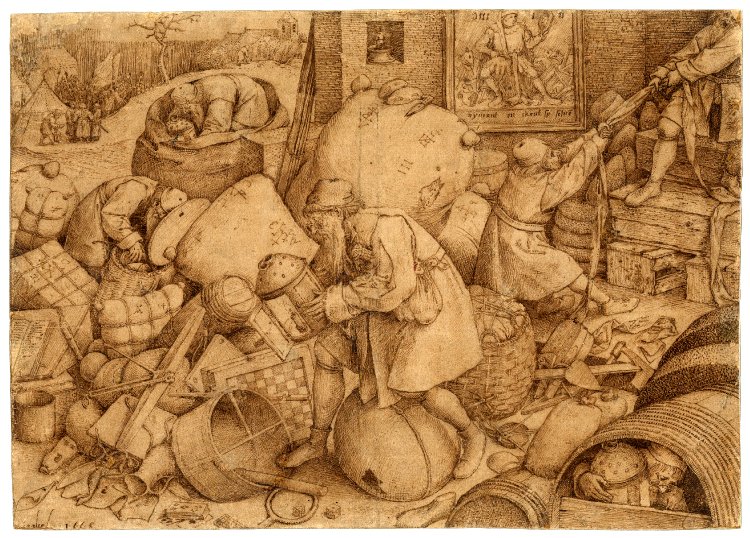Living in Harmony
Early humans, as low-impact hunter-gatherers, were as close to an ideal of living in harmony as ever.
The romantic contrast between modern industry that “destroys nature” and our ancestors who “lived in harmony with nature” is groundless. Long before the Industrial Revolution, Homo sapiens held the record among all organisms for driving the most plant and animal species to their extinctions. We have the dubious distinction of being the deadliest species in the annals of life.Since the first agricultural revolution around 10,000 BC, when humans began cultivating crops and domesticating wild species, we've become less harmonious and more destructive. And to what end?
― Yuval Noah Harari, Sapiens: A Brief History of Humankind
The Search
The most existentially poignant theme of Breugel's Everyman is the search for worldly goods and self-knowledge.
 |
| Everyman, pen and brown ink Pieter Bruegel, 1558 |
Bruegel depicts Elck (Everyman) in the center of his composition crowded by worldly goods, staring into an open lantern at a burning candle.
Everyman is in search of something (cf. Interpretation of Everyman). An inscription reads, Nobody knows himself. Another inscription below the image in a subsequent engraving made from Bruegel's drawing reads,
No one does not seek his own advantage everywhere, no one does not seek himself in all he does, no one does not look everywhere for private gain. This one pulls, that one pulls, all have the same love of possession.A Conscious Endeavor
Bruegel's allegorical drawing depicts the dark side of the human condition, bequeathing an unflattering portrait of humanity.
Where does this leave us? We're left with the notion of mindful living. Thoreau called it a conscious endeavor.
We must learn to reawaken and keep ourselves awake, not by mechanical aids, but by an infinite expectation of the dawn, which does not forsake us in our soundest sleep. I know of no more encouraging fact than the unquestionable ability of man to elevate his life by conscious endeavor.Mindful living is being awake, a heightening of the senses, and a conscious endeavor. When we're awake, we endeavor to make choices, rather than acting on impulse.
― Henry David Thoreau, Where I Lived, and what I Lived for
I tried to discover, in the rumor of forests and waves, words that other men could not hear, and I pricked up my ears to listen to the revelation of their harmony.
― Gustave Flaubert, November
REFERENCES
- Pieter Bruegel The Elder: Drawings and Prints, Edited by Nadine M. Orenstein, The Metropolitan Museum of Art, New York.
- November, Gustave Flaubert.
- Sapiens: A Brief History of Humankind, Yuval Noah Harari, Harvill Secker, 2014.
- Where I Lived, and what I Lived for, Henry David Thoreau, Penguin Great Ideas, 2006.

